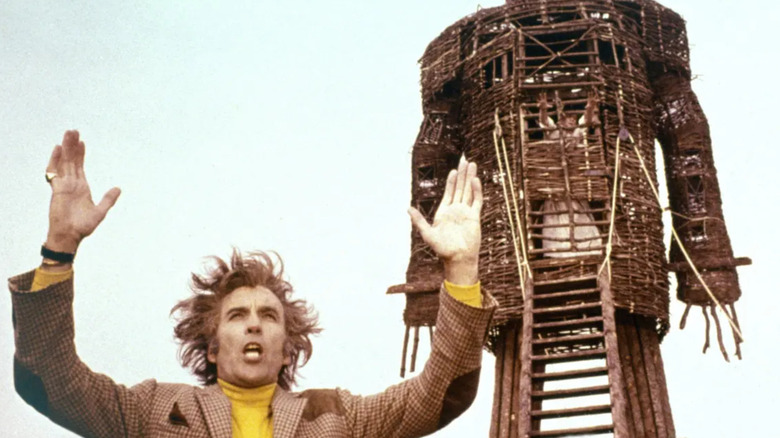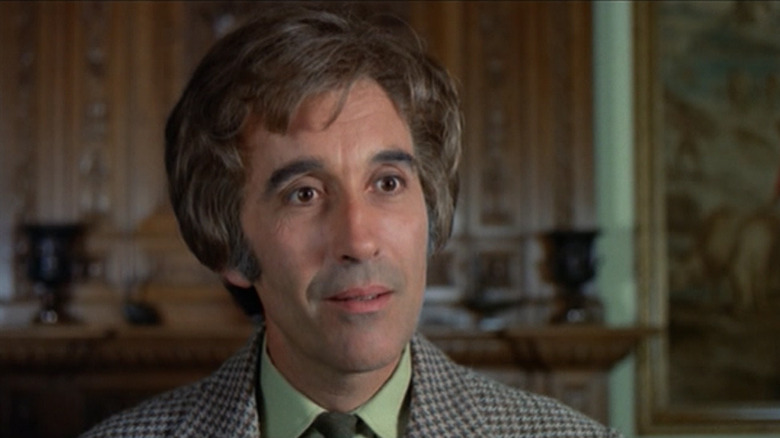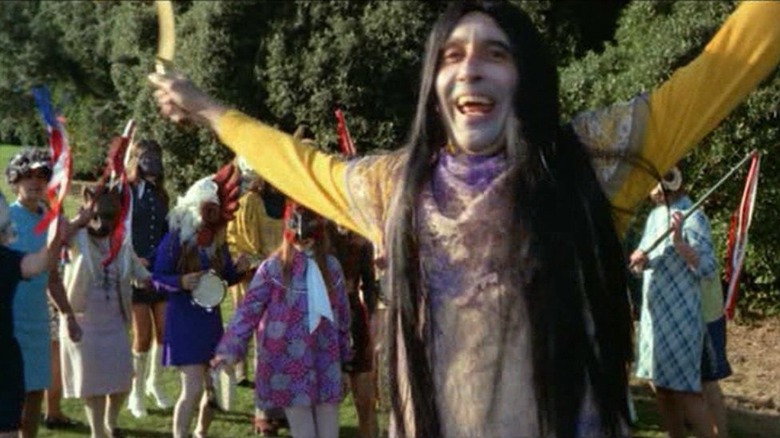Christopher Lee Had To Take Promoting The Wicker Man Into His Own Hands
During his life, Sir Christopher Lee appeared in more than 200 films. His favorite of these was the 1973 folk horror film "The Wicker Man," directed by Robin Hardy. Lee plays the enigmatic Lord Summerisle, leader of a Pagan cult on a remote Scottish island.
In a 2005 interview with Total Film, Lee referred to "The Wicker Man" as "one of the great cult movies of all time" and "the best film I've ever made." Lee also says that before he played Saruman in "The Lord of the Rings," "The Wicker Man" was the film which most people asked him about. However, were it not for Lee's proactivity in getting the film an audience, let alone an international release, it never would've achieved the cult hit status that it now has.
One man publicity team
The Independent's 2020 history of "The Wicker Man" explores how Lee single-handedly saved the movie from obscurity. But why did it fall on him to do this? Because the production studio behind the film, British Lion Films, didn't have faith in it; they didn't even host a press screening for the film. When it finally saw release in 1973, as the B-picture on a double bill with "Don't Look Now," Lee reached out to every film critic he was acquainted with, asking them to see the movie and even offering to pay for their tickets (his generosity proved unneeded; every critic who agreed paid their own fare). By working his telephone like a salesman, Lee delivered "The Wicker Man" an audience.
Lee's activism continued when it was time for "The Wicker Man" to expand beyond England. In 1975, the film was distributed in the U.S. by Warner Bros. Lee then traveled the country to publicize the release, all paid for out of his own pocket. After all, Lee hadn't signed onto the project for the money. As he recounted in the 2001 documentary, "The Wicker Man Enigma":
"I got paid nothing. I keep repeating to people and they don't believe it's true. I've got the contract to prove it. Anyway, sometimes you do things for love ... If they paid me my normal fee — and everyone else their normal fees — they wouldn't have been able to make the film."
Trimming the wicker
In the aforementioned Total Film interview, Lee mentions how the available cuts of "The Wicker Man" don't capture the scope of Hardy's vision: "Even the DVD is butchered. What happened to that film I still don't know. The negative disappeared from that day to this."
The original cut of the film was 99 (sometimes claimed as 102) minutes, but by its completion, British Lion was under new management. New managing director Michael Deeley sent a copy of "The Wicker Man" to Roger Corman for advice on American distribution; Corman suggested cutting the film to 87 minutes, and that was the version released in America. In 2013, a 92-minute version was discovered and released, with Hardy's approval. Still, the longest cut (and Lee's preferred one) is believed to be lost to time.
For the curious: Mark Kermode, a British film critic and "Wicker Man" fan has produced both a myth-busting write-up of the film's history and a concise explanation of the differences between the versions. In the former, Kermode writes:
"The recutting of 'The Wicker Man' from its original assembly to supporting feature-length was not commissioned as an act of malice by evil studio heads attempting to destroy a masterpiece. Despite having been roundly demonized for years by Christopher Lee, incoming British Lion head Michael Deeley (who inherited the picture from producer Peter Snell) did not claim that the film was one of the 10 worst he had ever seen."
Whatever Deeley's intent, his actions still suppressed the longest (and according to Lee, truest) version of "The Wicker Man." However, in a roundabout way, this only further illustrates Lee's love for "The Wicker Man." Lee's fondness for the film was so great, he still praised what amounted to, in his view, a vivisection of it.


